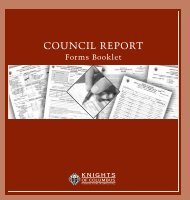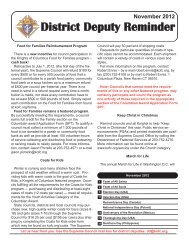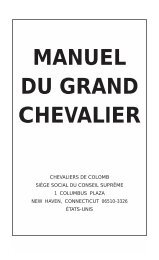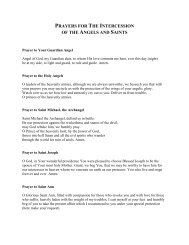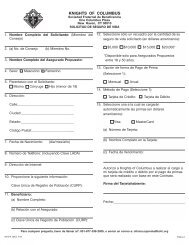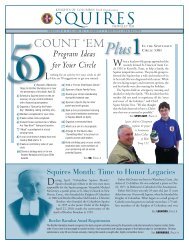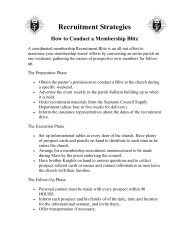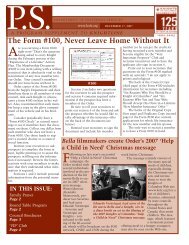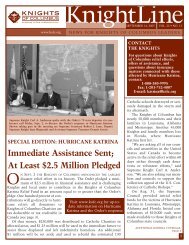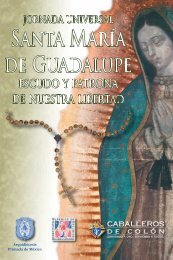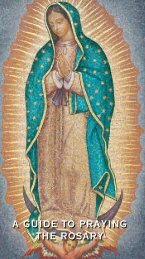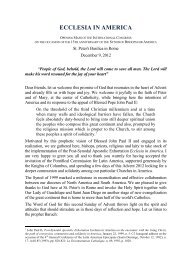CATHOLIC WORD BOOK - Knights of Columbus, Supreme Council
CATHOLIC WORD BOOK - Knights of Columbus, Supreme Council
CATHOLIC WORD BOOK - Knights of Columbus, Supreme Council
Create successful ePaper yourself
Turn your PDF publications into a flip-book with our unique Google optimized e-Paper software.
norms corresponding to man’s nature by<br />
which he orders his conduct toward God,<br />
neighbor, society and himself. This law,<br />
which is rooted in human nature, is <strong>of</strong><br />
divine origin, can be known by the use <strong>of</strong><br />
reason, and binds all persons having the<br />
use <strong>of</strong> reason. The Ten Commandments are<br />
declarations and amplifications <strong>of</strong> natural<br />
law. The primary precepts <strong>of</strong> natural law,<br />
to do good and to avoid evil, are<br />
universally recognized, despite differences<br />
with respect to understanding and<br />
application resulting from different<br />
philosophies <strong>of</strong> good and evil. (2) Divine<br />
positive law: That which has been revealed<br />
by God. Among its essentials are the twin<br />
precepts <strong>of</strong> love <strong>of</strong> God and love <strong>of</strong><br />
neighbor, and the Ten Commandments.<br />
(3) Ecclesiastical law: That which is<br />
established by the Church for the spiritual<br />
welfare <strong>of</strong> the faithful and the orderly<br />
conduct <strong>of</strong> ecclesiastical affairs. (See Canon<br />
Law.) (4) Civil law: That which is<br />
established by a socio political community<br />
for the common good.<br />
Liberalism: A multiphased trend <strong>of</strong><br />
thought and movement favoring liberty,<br />
independence and progress in moral,<br />
intellectual, religious, social, economic<br />
and political life. Traceable to the<br />
Renaissance, it developed through the<br />
Enlightenment, the rationalism <strong>of</strong> the<br />
19th century, and modernist and<br />
existentialist related theories <strong>of</strong> the 20th<br />
century. Evaluations <strong>of</strong> various kinds <strong>of</strong><br />
liberalism depend on the validity <strong>of</strong> their<br />
underlying principles. Extremist positions<br />
— regarding subjectivism,<br />
libertinarianism, naturalist denials <strong>of</strong> the<br />
supernatural, and the alienation <strong>of</strong><br />
individuals and society from God and the<br />
Church — were condemned by Gregory<br />
-44-<br />
XVI in the 1830s, Pius IX in 1864, Leo<br />
XIII in 1899, and St. Pius X in 1907.<br />
There is, however, nothing objectionable<br />
about forms <strong>of</strong> liberalism patterned<br />
according to sound principles <strong>of</strong> Christian<br />
doctrine.<br />
Liberation Theology: Deals with the<br />
relevance <strong>of</strong> Christian faith and salvation<br />
— and, therefore, <strong>of</strong> the mission <strong>of</strong> the<br />
Church — to efforts for the promotion <strong>of</strong><br />
human rights, social justice and human<br />
development. It originated in the<br />
religious, social, political and economic<br />
environment <strong>of</strong> Latin America, with its<br />
contemporary need for a theory and<br />
corresponding action by the Church, in the<br />
pattern <strong>of</strong> its overall mission, for human<br />
rights and integral personal and social<br />
development. Some versions <strong>of</strong> liberation<br />
theology are at variance with the body <strong>of</strong><br />
church teaching because <strong>of</strong> their<br />
ideological concept <strong>of</strong> Christ as liberator,<br />
and also because they play down the<br />
primary spiritual nature and mission <strong>of</strong> the<br />
Church. Instructions from the<br />
Congregation for the Doctrine <strong>of</strong> the Faith<br />
— “On Certain Aspects <strong>of</strong> the Theology <strong>of</strong><br />
Liberation” (Sept. 3, 1984) and “On<br />
Christian Freedom and Liberation” (Apr.<br />
5, 1986) — contain warnings against<br />
translating sociology into theology and<br />
advocating violence in social activism.<br />
Life in Outer Space: Whether rational life<br />
exists on other bodies in the universe<br />
besides earth, is a question for scientific<br />
investigation to settle. The possibility can<br />
be granted, without prejudice to the body<br />
<strong>of</strong> revealed truth.<br />
Limbo: The limbo <strong>of</strong> the fathers was the<br />
state <strong>of</strong> rest and natural happiness after



